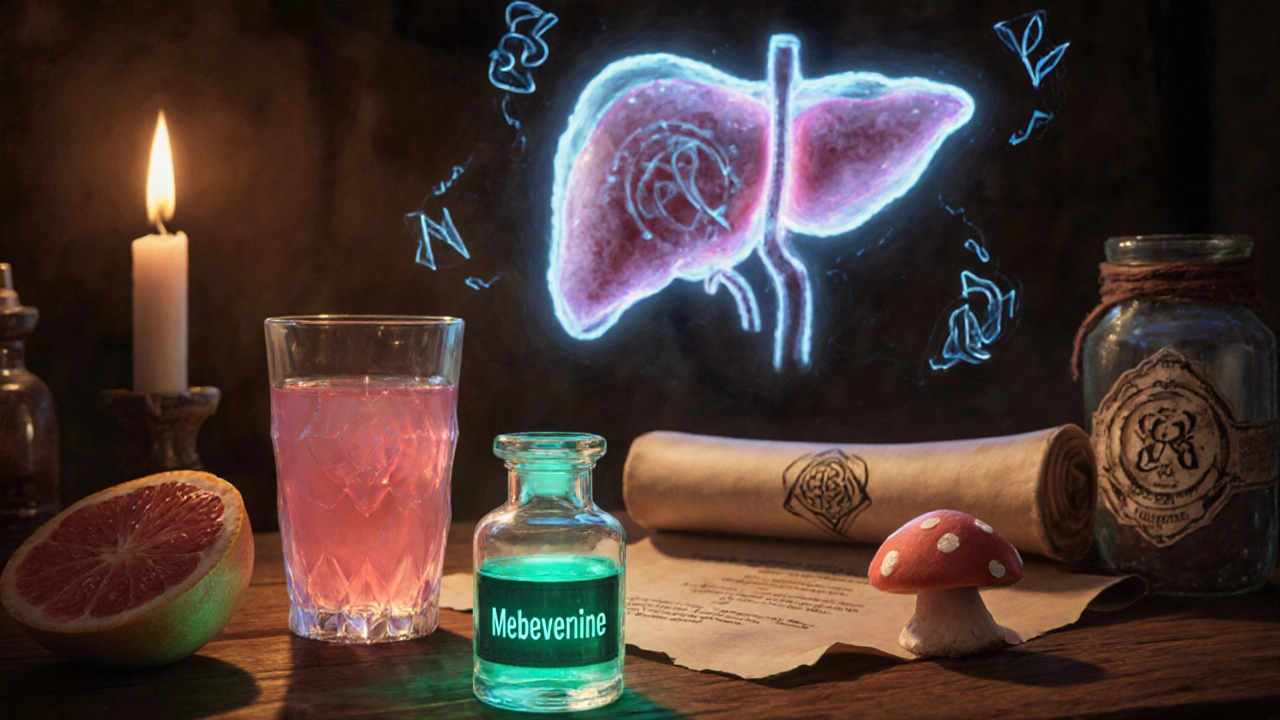Mebeverine Interaction Checker
Check for Mebeverine Interactions
Select medications, supplements, or foods you're taking with mebeverine to see potential interactions.
Ever wonder why your doctor warned you about mixing certain foods, drinks, or medicines with your IBS medication? mebeverine drug interactions can turn a helpful pill into a headache-or worse. This guide breaks down exactly what to watch out for, how the chemistry works, and what steps you can take to stay safe.
Quick Takeaways
- Mebeverine is metabolized mainly by the liver enzyme CYP3A4; anything that blocks or boosts this enzyme can change its level.
- Grapefruit juice, certain antibiotics, and antifungals are the top culprits that raise mebeverine concentrations.
- Anticholinergic drugs, some antidepressants, and digoxin may feel stronger when taken with mebeverine.
- Alcohol doesn’t directly affect mebeverine, but it can worsen gut symptoms and mask side effects.
- Always share your full medication list with your pharmacist or prescriber before adding a new drug or supplement.
What Is Mebeverine?
Mebeverine is an antispasmodic medication used to relieve muscle cramps in the gut, especially for people with irritable bowel syndrome (IBS). It works by relaxing the smooth muscles of the intestine without affecting normal motility, which helps reduce abdominal pain and cramping.
How Mebeverine Is Processed in the Body
The drug is taken orally, absorbed in the small intestine, and then largely metabolized in the liver by the enzyme CYP3A4. This enzyme is a busy metabolic hub and handles many other prescription and over‑the‑counter substances. Anything that interferes with CYP3A4 can either slow down mebeverine breakdown (raising its level) or speed it up ( lowering its effect).

Common Interaction Triggers
Below is a practical look at the most frequent culprits, grouped by how they affect mebeverine.
| Substance | Interaction Type | Potential Effect | Management Tip |
|---|---|---|---|
| Grapefruit juice | CYP3A4 inhibitor | Increases mebeverine levels → higher risk of dizziness, dry mouth | Avoid regular consumption; limit to occasional small amounts |
| Erythromycin, clarithromycin | Strong CYP3A4 inhibitor | Significant rise in drug concentration | Physician may lower dose or choose alternative antibiotic |
| Ketoconazole, itraconazole | Antifungal CYP3A4 inhibitor | Elevated mebeverine exposure | Monitor symptoms; consider dose adjustment |
| Rifampin, carbamazepine | CYP3A4 inducer | Decreased mebeverine effectiveness | May need higher mebeverine dose; discuss with doctor |
| Anticholinergic drugs (e.g., diphenhydramine) | Pharmacodynamic additive | Excessive dry mouth, blurred vision, constipation | Space out dosing; watch for side‑effects |
| SSRIs (e.g., sertraline, fluoxetine) | Pharmacodynamic additive | Potential increase in gastrointestinal discomfort | Start at low doses; monitor mood‑related GI changes |
| Digoxin | Potential pharmacokinetic interaction | Altered digoxin levels (rare but reported) | Check digoxin blood levels if both drugs are used |
| Warfarin | Possible effect on clotting time | Unpredictable INR changes | Increase INR monitoring frequency |
| Alcohol | Pharmacodynamic | Worsens IBS symptoms; may mask dizziness | Limit intake; avoid binge drinking |
Food and Lifestyle Factors
Beyond drinks, certain foods can tip the balance. Grapefruit juice is the classic CYP3A4 blocker, but other citrus fruits (e.g., Seville oranges) have similar effects. High‑fat meals can slow absorption, making the onset of relief feel delayed.
Alcohol doesn’t change the metabolic pathway, yet it can aggravate IBS flare‑ups and obscure side‑effects like light‑headedness. If you notice extra stomach pain after a night out, it’s probably the alcohol rather than the pill.
Prescription and Over‑the‑Counter Medications to Review
Take a moment to scan your medication cabinet. Here’s a quick checklist:
- Antibiotics: macrolides (erythromycin, clarithromycin) and fluoroquinolones can interfere with CYP3A4.
- Antifungals: ketoconazole, itraconazole are potent inhibitors.
- Anticonvulsants: carbamazepine, phenytoin induce CYP3A4, lowering mebeverine levels.
- Antidepressants: SSRIs and some SNRIs may increase GI sensitivity when combined.
- Anticholinergics: diphenhydramine, oxybutynin can amplify dry‑mouth and constipation.
- Heart meds: certain calcium‑channel blockers (e.g., verapamil) have minor CYP3A4 interaction risk.
If any of these ring a bell, jot them down and discuss with your pharmacist.

Managing Interactions: Practical Steps
- Keep a medication list: Write down prescription drugs, OTCs, supplements, and herbal products. Update it whenever you start or stop something.
- Ask before adding a supplement: Even “natural” items like St.John’s wort are strong CYP3A4 inducers.
- Space out dosing times: If you must take an interacting drug, give a 2‑hour gap before or after mebeverine to reduce peak overlap.
- Monitor symptoms: Notice unexpected dizziness, severe constipation, or changes in blood test results (like INR for warfarin). Report them promptly.
- Consider dose adjustments: Your doctor might lower mebeverine to 100mg three times daily instead of 200mg, or switch you to an alternative antispasmodic such as hyoscine.
Special Populations
Children, pregnant women, and older adults process drugs differently.
Pregnant patients should only use mebeverine if the benefit outweighs any unknown risk; limited data suggest it’s relatively safe, but always confirm with obstetrics.
Older adults often take multiple meds (polypharmacy), raising the chance of interactions. A pharmacist-led medication review every six months can catch hidden risks.
People with liver impairment have reduced CYP3A4 activity, meaning mebeverine may accumulate. Dose reduction or alternative therapy is usually recommended.
When to Seek Professional Help
If you experience any of the following, contact your healthcare provider right away:
- Severe dizziness or fainting.
- Rapid heartbeat or palpitations.
- Unexplained bleeding or bruising (possible warfarin interaction).
- Persistent constipation or worsening abdominal pain despite treatment.
These signs could indicate that an interaction has pushed drug levels outside the therapeutic window.
Frequently Asked Questions
Can I drink grapefruit juice while taking mebeverine?
No. Grapefruit juice blocks the CYP3A4 enzyme that clears mebeverine, raising its blood level and increasing the chance of side‑effects like dry mouth or dizziness. Stick to water or non‑citrus beverages.
Do antibiotics affect mebeverine effectiveness?
Certain antibiotics, especially macrolides like erythromycin, inhibit CYP3A4 and can raise mebeverine concentrations. This usually isn’t dangerous but may cause stronger side‑effects. Your doctor may adjust the dose or pick a different antibiotic.
Is it safe to combine mebeverine with over‑the‑counter antacids?
Most antacids (like calcium carbonate) do not affect CYP3A4 and are generally safe. However, large doses of aluminum‑based antacids may bind mebeverine in the gut and slightly reduce its absorption. Take them at least an hour apart to be safe.
Can I use herbal supplements such as St.John’s wort?
St.John’s wort is a strong CYP3A4 inducer; it can lower mebeverine levels, making the medication less effective. Avoid it unless your doctor specifically approves a dose change.
What should I do if I miss a dose?
Take the missed tablet as soon as you remember, unless it’s almost time for your next dose. In that case, skip the missed one and continue with your regular schedule-don’t double‑dose.

 Pharmacology
Pharmacology
Jarrod Benson
August 27, 2025 AT 21:26Wow, the mebeverine interaction landscape is like a giant puzzle of enzymes and everyday meds. First off, you gotta know that CYP3A4 is the main highway that clears mebeverine from your system. If you block that highway with something like grapefruit juice, the drug piles up and you might feel dizzy or have a nasty dry mouth. On the flip side, if you speed it up with rifampin or carbamazepine, the pill barely does anything and your IBS symptoms come roaring back. That's why doctors always ask about antibiotics, especially macrolides such as erythromycin or clarithromycin, because they sit right in the middle of that blockage zone. Antifungals like ketoconazole and itraconazole also love to hang out with mebeverine and push its levels higher, so keep an eye on them. Even over‑the‑counter antihistamines like diphenhydramine can add up the anticholinergic load, making your mouth feel like the Sahara desert. SSRIs such as sertraline and fluoxetine are generally low‑risk, but they can tweak gut sensitivity, so stay alert for extra cramping. Warfarin users should get their INR checked more often because the interaction can be unpredictable. If you’re on digoxin, a quick blood test can confirm the levels haven’t shifted weirdly. Alcohol won’t change the metabolism directly, but it can aggravate IBS flare‑ups and hide the subtle dizziness that mebeverine might cause. High‑fat meals can delay absorption, meaning the relief may feel later than expected, so timing matters. The best habit is to keep a running list of every prescription, supplement, and even herbal product you take, updating it whenever you start something new. Talk to your pharmacist before you grab that new herbal tea or vitamin; they can flag hidden CYP3A4 inducers like St. John’s wort. Ultimately, staying proactive and communicating openly with your healthcare team turns a potentially tricky drug combo into a smooth ride for your gut.
Liz .
August 31, 2025 AT 21:53Grapefruit juice is a no‑go with mebeverine its the classic enzyme blocker you wanna avoid
tom tatomi
September 4, 2025 AT 21:43I doubt the grapefruit issue matters for most people.
Tom Haymes
September 8, 2025 AT 21:33Think of your medication routine like a well‑tuned orchestra; each instrument must play in harmony. When mebeverine joins the ensemble, you want the tempo set right, not a sudden drum solo from an antibiotic. Keep a written log so you can spot the discord before it becomes a cacophony. If you notice dry mouth or dizziness, check if you’ve added a new drug that could be the culprit. A quick chat with your pharmacist is like a conductor’s cue-keeps everything on beat. Remember, consistency and communication are the keys to a smooth performance.
Scott Kohler
September 12, 2025 AT 21:23Oh sure, because nothing says “I trust my doctor” like hiding a secret cocktail of CYP3A4 inhibitors from the very people who profit from our confusion. The pharmaceutical conglomerates love to bury these interaction warnings deep in the fine print, hoping we’ll never notice until our heads spin. If you’re truly concerned, maybe consider ditching the brand name and making your own home‑brew of herbal extracts-just kidding, don’t do that. Seriously, though, a little vigilance goes a long way in outsmarting the system. Keep your INR checks regular if you’re on warfarin, and maybe the “big pharma” will finally pay attention.
Brittany McGuigan
September 16, 2025 AT 21:13As an American who takes pride in our healthcare independence, I must say that relying on foreign drug interaction charts is not ideal. We should demand our own clear guidelines without the confusing European jargon. The current guide is good but it woudln't hurt to spell out that grapefruit woudl be avoided, no need for fancy tables. Also, make sure to double‑check the dosage, because many folks wont read the fine print. Let's keep our gut health strong and our meds safe, sir.
Jennifer Boyd
September 20, 2025 AT 21:03Hey folks! It’s awesome to see so many people paying attention to their gut health. Knowing the ins and outs of mebeverine interactions can actually empower you to feel better faster. Imagine a day where you can enjoy a tasty meal without worrying about hidden side effects-totally doable! Keep that medication list handy, share it with your doctor, and celebrate each small win. You’ve got this, and your digestive system will thank you.
Lauren DiSabato
September 24, 2025 AT 20:53While the average reader might skim the interaction table, a deeper pharmacological analysis reveals that the inhibition constants (Ki) of grapefruit flavonoids are substantially lower than those of most macrolides, thereby presenting a more pronounced effect on CYP3A4 activity. Consequently, the recommendation to limit grapefruit consumption is not merely anecdotal but grounded in kinetic data. Moreover, the interplay between mebeverine’s metabolites and anticoagulant pathways warrants periodic monitoring of PT/INR values. Ignoring these nuances could lead to suboptimal therapeutic outcomes.
Hutchins Harbin
September 28, 2025 AT 20:43Just a quick note on the writing style: the guide does a solid job, but there are a few places where commas could improve readability-for example, after “high‑fat meals” and before “meaning the relief may feel later”. Also, consider using parallel structure in the bullet points to keep the list consistent. Small tweaks like these make the information easier to digest, much like the drug itself does for the gut.
Benjamin Herod
October 2, 2025 AT 20:33Wow, the interaction chart looks like a dramatic soap opera-cut! The plot twists are real.
luemba leonardo brás kali
October 6, 2025 AT 20:23The compiled interaction chart succinctly categorizes substances by their effect on CYP3A4, providing clear guidance for dosage adjustments. It also emphasizes the importance of regular INR monitoring for patients on warfarin, which is a critical safety measure. Overall, the document serves as a practical reference for both clinicians and patients.
Corey McGhie
October 10, 2025 AT 20:13Nice summary! Just make sure to keep that medication list updated after every pharmacy visit-otherwise you’ll miss the occasional hidden inducer.
Ajayi samson
October 14, 2025 AT 20:03Really, the “big pharma” angle is overblown; most interactions stem from well‑known enzyme pathways that anyone with a basic pharmacology textbook can read.
Lief Larson
October 18, 2025 AT 17:06Remember to space out mebeverine from antibiotics two hours and you’ll be good